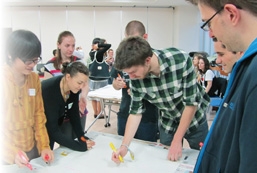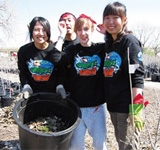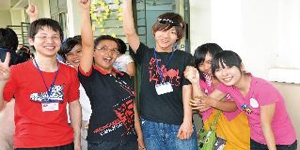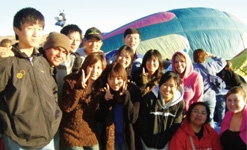In addition to standard one-year study abroad programs, Hiroshima University offers a new style of program based on student exchange, while each school offers a diverse range of overseas training and internship programs.

HUSA Program: exchange program with partner universities overseas
*HUSA stands for Hiroshima University Study Abroad Program.
This is a study abroad program that enables undergraduates and postgraduates (in some cases, undergraduates only) to spend a semester or a year studying overseas for the purpose of study, gaining experience of other cultures, and learning another language; while studying overseas, program participants attend the same classes as local students and can have the credits they receive recognized as credits for their degree at Hiroshima University (there are some cases in which this is not possible).
- Click here for details (information for incoming students)
- Click here for details (information for HU students seeking to study abroad)(Japanese page)
AIMS-HU Program: exchange program with partner universities in ASEAN countries
The Asian International Mobility for Students (AIMS) Programme is SEAMEO RIHED’s regional initiative to support the mobility of students and enhance cooperation in higher education among countries in Asia. ‘AIMS-HU’ is AIMS program implemented at Hiroshima University.
It provides students with opportunities to study abroad, taking professional and common courses in English.
PEACE Student Exchange Program: study abroad in CLMV countries or Thailand
*“PEACE” stands for “Project of Effective Action with CLMVʼs Education” and is an exchange program with partner universities in CLMV countries (Cambodia, Laos, Myanmar and Vietnam) and Thailand.
Undergraduate and graduate students on this program (but some programs are only available to undergraduates or graduates) study abroad at partner universities in CLMV countries or Thailand for periods ranging from several days to a full year. Program participants take professional courses mainly in English and/or engage in research activities including fieldwork in the host country.
USAC Program: a new kind of exchange program
*USAC stands for University Study Abroad Consortium.
This was originally a program for students from the USA, to enable them to undergo linguistic and cultural training at universities across the globe. Through this program, students at this university can remain enrolled here while spending a summer, a semester or a year at one of 34 universities in 23 countries across the globe, not only in Europe or the USA, but also Asia, Central and South America, Oceania, and Africa.
If you study at Hiroshima University and participate in an exchange program...
- There are destinations across the globe. USA, Canada, UK, Australia, China, Germany, France...
- You can start your international exchange activities even before your actual study overseas begins.
- During your period of study abroad, you continue to pay tuition fees to this university, so you do not need to pay anything to the overseas university where you are studying. (Fees for expenses such as travel to the destination, living costs, and overseas travel insurance are borne by the participant)
- A number of students receive scholarships from the Japan Student Services Organization (JASSO).
Comments from students who have already engaged in study abroad
- Every single day felt precious, and even daily life and having fun were useful learning experiences.
- My linguistic ability improved and it was useful for job-hunting and my future life.
- Even since returning home, I've continued to keep in touch with my dormitory room-mate, my host family, and my friends in various parts of the globe.
- Living overseas gave me confidence and I think I'm a stronger person for it.
- It was useful for my research and my academic knowledge and skills.
- I acquired a cosmopolitan outlook and my values changed.
- I developed the ability to voice my opinions clearly.
- I did many things that wouldn't have been possible in Japan, including parties, travel, and intercultural experiences, so every day was exciting.
- Click here for details (HUSA Participants' Voices)
- Click here for details (HUSA Participants' Voices)(Japanese page)
Overseas Training: A diverse range of programs
University of Exeter English Language Training Program (open to the whole university)
This program offers students the opportunity to spend about a month in the UK, experiencing a homestay at the University of Exeter, while attending classes in English given by expert staff members.
English + ALOHA Program (open to the whole university)
This program provides participants with the foundations to enable them to function effectively in English, teaching the skills essential to engaging in in-depth studies in a specialist field at university, as well as providing instruction in the English language.
Students spend three weeks studying at the University of Hawaii at Manoa, which is famous for its language education programs.
Hiroshima University Special Training Program in Chinese Language and Culture (open to the whole university)
As well as studying Chinese at Capital Normal University in Beijing, China, participants in this training program held over three weeks during the summer vacation come into contact with Chinese history and culture through activities including visits to the Forbidden City and the Great Wall, as well as watching a Beijing Opera performance.
START:Study Tour Abroad for Realization and Transformation START* Program (for first-year undergraduates)
*START: Study Tour Abroad for Realization and Transformation
This program was instituted with the objective of providing first-year undergraduates with little experience of overseas travel with the opportunity to visit an overseas university and develop a greater interest in international exchange and study abroad through interacting with local students and gaining first-hand experience of a culture and environment that differs from those in Japan. The implementation of this program during the long vacation and the fact that the fee is partly subsidized by the Hiroshima University Fund makes it possible for a broader range of students to study abroad.



INU Student Seminar on Global Citizenship and Peace
This is a one-week intensive experiential education course held at Hiroshima University, which brings together lecturers and students from universities across the globe to learn about global citizenship and peace through learning about first-hand experiences of radiation exposure, attending the Peace Memorial Ceremony, listening to lectures given by renowned guest speakers, and engaging in workshops and a mock United Nations General Assembly (held in early August each year).
Participants can attend classes with an international flavor and become friends with university students from overseas, without having to leave Hiroshima. You can also gain a credit for this if you register it in advance as one of your liberal arts subjects.
Double Degree Programs
This program enables students to gain credits from both Hiroshima University and one of its overseas partner universities by taking classes in the standard curriculum of both universities. This university is actively striving to develop double degree programs in partnership with overseas universities, in order to cultivate talented people who can play a key role on the international stage in the future.
INU Double Degree Program: Global Citizenship and Peace
Hiroshima University runs the Global Citizenship and Peace double degree program in partnership with universities that belong to the INU. Students spend a year studying at one of our partner universities in this program (in South Korea, Australia, or the UK), and can obtain a master's degree from both this university and the overseas university in as little as two years. The program is open to students at the Graduate School of Education, the Graduate School of Social Sciences, and the Graduate School for International Development and Cooperation; conditions of entry include conditions relating to academic performance and English language ability.
Overseas Internships
Engineers to Cross Borders educational program
This program is open to students at the Graduate School of Engineering and the Graduate School for International Development and Cooperation. It offers opportunities for participants to develop as global engineers who can function effectively overseas, irrespective of national borders (particularly at development and production sites in Asian countries). Every year, the university dispatches around ten postgraduate students with an interest in the issued faced by Asian countries and technology transfer to that region to spend a month at the plants and offices of Japanese companies that have expanded into Asia.
Special Educational Program in Collaboration with the JICA Japan Overseas Cooperation Volunteers (Zambia Program)
Under this program, students are dispatched to the Republic of Zambia for two years, remaining enrolled at the university while serving with the Japan Overseas Cooperation Volunteers as science and mathematics teachers in Zambia. The program is open to students at the Graduate School for International Development and Cooperation (students at the Division of Educational Development and Cultural and Regional Studies who hold Japanese nationality); participants continue to receive instruction from their course professors even during their time overseas. While improving their skills and abilities through practical experience of development assistance in the field and conducting research into this, participants put together a master's thesis based on their activities.
Explorers of International Cooperation Studies to Cross Borders (i-ECBO) Program
This is one of Japan's more unusual graduate school educational programs, being focused on overseas internships. The objective of the program is to provide participants with the design capabilities required to engage in research in the field of international cooperation studies at universities, international cooperation organizations, and private sector companies in the future.
Aimed at students at the Graduate School for International Development and Cooperation, participants are dispatched to countries including Bangladesh, Indonesia, Vietnam, the Philippines, and Kenya for periods of up to six months.
Global Internship (G.ecbo) Program
In this practical educational program, which is open to postgraduate students throughout the university, students undergo training (lectures, PBL, English) before the internship and conduct research (exercises, thesis) after it. The program aims to cultivate researchers who can adapt to a diverse range of fields and new issues, practitioners who can provide leadership on the front lines of international cooperation and international aid, and high-level professionals from among the international students and trainees who gather from across the globe. The internships offered fall into the following three categories.
- Overseas internships, in which Japanese and international students are dispatched to developing countries
- Domestic internships, in which international students are dispatched to companies and organizations within Japan
- Third-party internships, in which trainees from developing countries gather in a third-party country and training is provided based on Japanese knowledge and experience
International Student Exchange Support System Scholarships
International Student Exchange Support System Scholarships (short-term)
This scholarship system run by the Japan Student Services Organization (JASSO) provides support to students who are being dispatched to overseas universities for short periods (3 months - 1 year), based on student exchange agreements concluded with overseas universities. At Hiroshima University, students applying for the Hiroshima University Study Abroad (HUSA) Program are eligible for this.
International Student Exchange Support System Scholarships (long-term)
This is open only to students who will graduate from this university by the time their Japan Student Services Organization (JASSO) study abroad program starts, who have a bachelor's degree or who, at the time of application, are expected to be awarded one (age restrictions and other conditions apply). By providing Japanese students studying at universities overseas with the funding required for their education and research activities, JASSO aims to further enhance international student exchange and promote greater mutual understanding, friendship, and goodwill between Japan and other countries, as well as contributing to the internationalization of Japan and strengthening of its international competitiveness.


 Home
Home